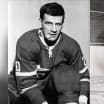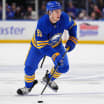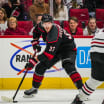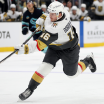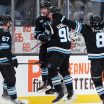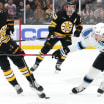NASHVILLE -- His name is Stanley. He's a blue bulldog on the wall of the Nashville Predators locker room and the sleeves of their sweatshirts, clenching a bone in his teeth with the words "SPEED" and "ATTITUDE." He's more than a mascot.
Coach Peter Laviolette called him "an image of what you'd want your team to look like and how you would want them to play."
Predators playing with 'dog-on-a-bone mentality' against Ducks
Nashville thriving in Western Conference Final by pushing pace, attacking in all three zones
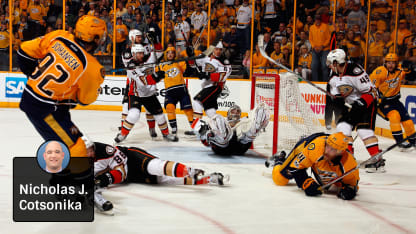
He has been around since the regular-season opener, but now it's like he's on the ice. The image of Stanley has become reality in the Stanley Cup Playoffs. The Predators enter Game 4 of the Western Conference Final at Bridgestone Arena on Thursday (8 p.m. ET; NBCSN, CBC, TVA Sports) leading the Anaheim Ducks 2-1 in the best-of-7 series.
"We definitely know what our identity is," defenseman P.K. Subban said. "It's that kind of dog-on-a-bone mentality. We want to dictate the pace of the game and we want to attack you in all three zones as a five-man unit and be tough to play against."
After missing the playoffs in 2013 and '14, general manager David Poile made the tough decision to fire Barry Trotz, the only coach the Predators had known since entering the NHL in 1998. Poile hired Laviolette and reshaped the roster to fit his new coach's up-tempo style.
It has been an evolution from season to season. The Predators lost to the Chicago Blackhawks in six games in the Western Conference First Round in 2015. They lost to the San Jose Sharks in seven games in the second round last year.
"Ever since I got here, the team's been building towards getting better," said forward James Neal, acquired by the Predators from the Pittsburgh Penguins on June 27, 2014. "I think you've seen that over the years, going deeper into the playoffs. Last year was a tough loss in Game 7, and coming back into this year, I think we were a little more experienced and ready to take that next step."
It has been an evolution this season. The Predators were popular picks to come out of the West, then stumbled in October. They looked good in November, then stumbled again. They had to adjust to injuries and changes, none bigger than acquiring Subban from the Montreal Canadiens for defenseman Shea Weber on June 29. But the Predators were one of the best teams in the NHL in the second half of the regular season, even though they finished 16th in the NHL standings and were the second wild card in the West.
"We were trying to become consistent with that identity," Laviolette said. "As we moved to the last month and a half, two months of the season, I thought we were pretty consistent with our game, and as we approached the playoffs, I think the guys felt confident."
The Predators swept the Blackhawks in the first round. They defeated the St. Louis Blues in six games in the second round. They split the first two games of the conference final on the road, then dominated Game 3 at home, outshooting the Ducks 40-20 in a 2-1 victory. They are 6-0 in the playoffs at home and are on a 10-game playoff winning streak at Bridgestone Arena, dating to last year.
Their engine is their top four on defense: Subban, Mattias Ekholm, Ryan Ellis and Roman Josi. They challenge not only at their own blue line, but at the red line. They join the rush. They pinch. That causes coverage problems and aids the forecheck.
RELATED: [Complete Predators vs Ducks complete series]
"They're keeping a lot of pucks in," Ducks forward Jakob Silfverberg said. "They're getting a lot of zone time, and sometimes that can be a little bit frustrating because maybe you don't get as much room as you're used to out there, especially as a winger. So they're a super-aggressive team. Especially with the crowd behind their back, it's tough to handle sometimes. It's tough to generate any offense."
It's a wonder the Predators don't get, well, dog tired.
"It's unique in how they can sustain it the whole game," Ducks defenseman Cam Fowler said. "You'll see teams do that over the course of the season, but they'll do it for stretches at a time. It's pretty rare to see a team that expects their players to do that for a full 60 minutes, and that's what they do. But they obviously feel like they have the players and the speed to do that, and it's effective and it's hard to play against."
The Ducks need to use the Predators' identity against them by making plays under pressure.
"You can get them spread out, because their first two forwards are so aggressive that if you make a couple plays, there's a lot of ice there to take advantage of," Fowler said. "We stopped doing that as the game went on, and obviously we were stuck in our own end."
But that's easier said than done. Ever try to keep a bone from a bulldog?

